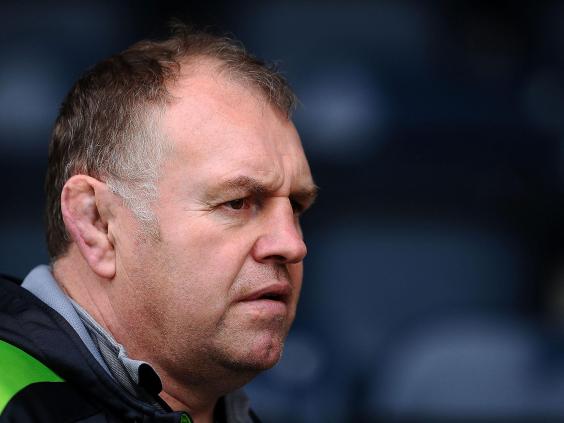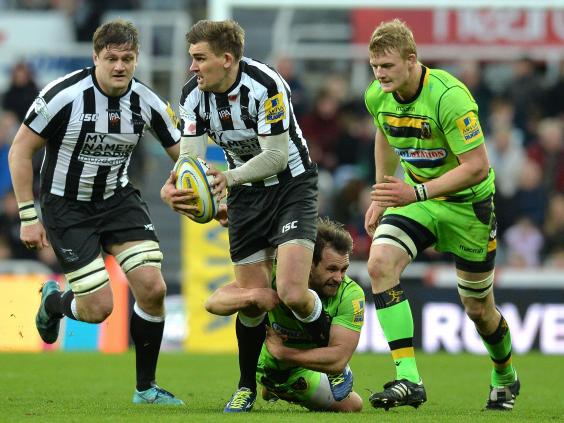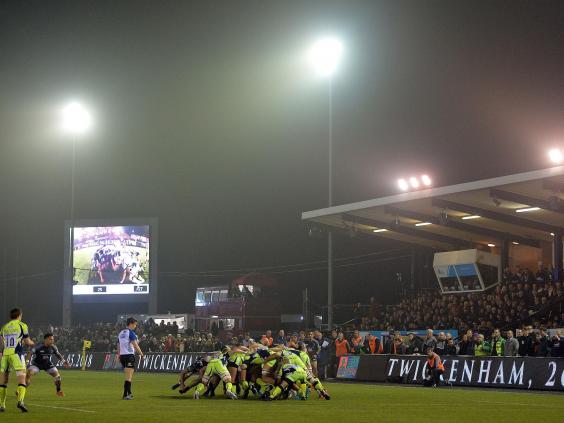Newcastle's most exciting season in rugby union since the short-lived, high-rolling Aviva Premiership-winning
team of Rob Andrew, Inga Tuigamala, Pat Lam and co, 20 years ago, could
be just the start of a new surge in the north-east of England.
The Falcons under director of rugby Dean Richards and stalwart
captain Will Welch currently stand fourth in the Premiership, with a
good shot at securing a first-ever place in the title play-offs (when
Andrew lifted the trophy in May 1998, with Tuigamala, Lam, Dean Ryan and
a young Jonny Wilkinson among his colleagues, it was under the old
system of first-past-the-post).
Richards’s team also have a European Challenge Cup
semi-final away to Gloucester this Friday night, and it is the breaking
of new ground on the international front in the next year or so that is
creating big expectations, according to Mick Hogan, the Falcons’
commercial director and a man steeped in the long-haul challenge of
building a rugby audience in Toon-Army football territory.
A decision on where Eddie Jones’s England side will play the match
they plan to take away from Twickenham to the north of the country in
the summer of 2019 is expected in the next couple of weeks.
Newcastle are in discussions with the Rugby Football Union over
staging the game at the city’s St James’ Park football stadium, with a
rival bid believed to have come from Manchester, while Liverpool and
Sunderland could choose to put themselves forward now or in the future.
Add to that Newcastle’s already successful bid – underwritten by Falcons’ owner, Semore Kurdi – to host the finals of the European Champions Cup
and Challenge Cup in May 2019, and there is tangible substance to
Hogan’s passionate view that rugby can find a fresh foothold to add to
its established bases in London, the South-West and the Midlands.
The 52,000-capacity St James’ Park can already be considered a
tried-and-tested rugby venue, having staged three union World Cup
matches in 2015, four Magic Weekends in rugby league, and the
breakthrough first Premiership Big One last month, when 30,000-plus
spectators watched the Falcons beat former champions Northampton, 25-22.

Dean Richards' men are on the brink of a first-ever place in the title play-offs (Getty)
“Cricket annually has Test matches in venues away from London and it
would be great for rugby union to do the same,” said Hogan, who is in
his second stint working with Falcons having also been chief executive
at Sale Sharks and Wigan Warriors.
“Even if it is one match in Newcastle every three or four years, the
benefit in popularising rugby would far outweigh the loss in revenue to
the RFU of not playing at Twickenham.
“We had 196 teams and 2,500 kids playing rugby at Kingston Park on the morning of The Big One at St James’ Park in March.
“When the European club finals come here next May we will do what we
did for the Rugby World Cup, and have a fan village in the centre of the
city, and work hard in marketing and social media to encourage visitors
to come a day ahead of the Challenge Cup final on the Friday, and leave
a day after the Champions Cup final on the Saturday.
“By taking these finals to Lyon [in 2016], Bilbao this year and
Newcastle next year, European rugby has offered new places for
supporters to go – and we will offer the best party in the UK to go
alongside a final, if Saracens v Clermont last year is anything to go
by, of international quality.”

St James' Park
staged the breakthrough Premiership Big One last month (Getty)
Kurdi’s Falcons are the lead partners in the latter venture,
alongside the city council and the Newcastle-Gateshead Initiative, and
Hogan says “everybody will make a bit of money” if a crowd of 25,000
turns up to the Challenge Cup final, and 50,000 to the Champions Cup
showpiece.
“The Big One was a huge success, at the top end of our expectations
for the crowd figure, but it was a 13-year project for myself,” Hogan
said. “We first had discussions about it with Newcastle United in 2005,
before Harlequins ever did their Christmas ‘Big Game’ at Twickenham.
“Newcastle is a one-club football city. But we got thousands of
football fans along to the Big One and I am happy they enjoyed it.
“If Falcons get stronger, local community rugby will get stronger.
The professional team is having a good season – the best for 20 years –
but we know we’re in an area where I describe football as being one step
off a religious cult.
“Newcastle United have fans going back through 10 generations –
people supporting them because their dad did, and his dad before him. We
are only just starting to build that, with children following their
mums and dads.”
Hogan is predicting Falcons’ second sell-out crowd of 10,000 at
Kingston Park this season when Wasps visit on 5 May, with a play-off
place possibly at stake.
“Raising our average home attendance by 1,000 across the season is
worth a clear £250,000 profit to the club, to be invested back into the
club,” he said.

A sell-out crowd of 10,000 at Kingston Park is expected for when Wasps visit on 5 May (Getty)
“People like success, and we have to keep succeeding in order for it to snowball.
“Over in Manchester, the Sale academy is fantastic, and we, like
them, are getting local young players through and – critically –
starting to hold onto them.
“It takes eight to 10 years for investment in an academy to come
through and, in the meantime, if someone waves twice as much money at a
player to go down south, it is pretty tempting.
“If we can offer success and a strong coaching set-up and great facilities, it bodes well for the future.”
The ultimate dream of Newcastle Falcons
playing in the European Champions Cup final at Newcastle United’s
city-centre fortress 13 months from now may seem fanciful, but
Richards’s men could at least make sure of qualifying for the
competition’s pool stage next season by finishing in the Premiership’s
top six or via the Challenge Cup.
The 12 Premiership clubs receive a divvy-up of central revenues based
on their shareholding, regardless of which competition they are in, so
the main financial benefit of being in the Champions Cup lies in selling
tickets for home matches.
“No disrespect to hosting a Russian team in this season’s Challenge
Cup,” said Hogan, “but we think we’d sell out at least two matches if we
had three heavyweight teams from across Europe coming to Kingston Park,
on top of our second Big One next year.
“Newcastle offers as good an experience as any city across the country, in any sport.”










No comments:
Post a Comment